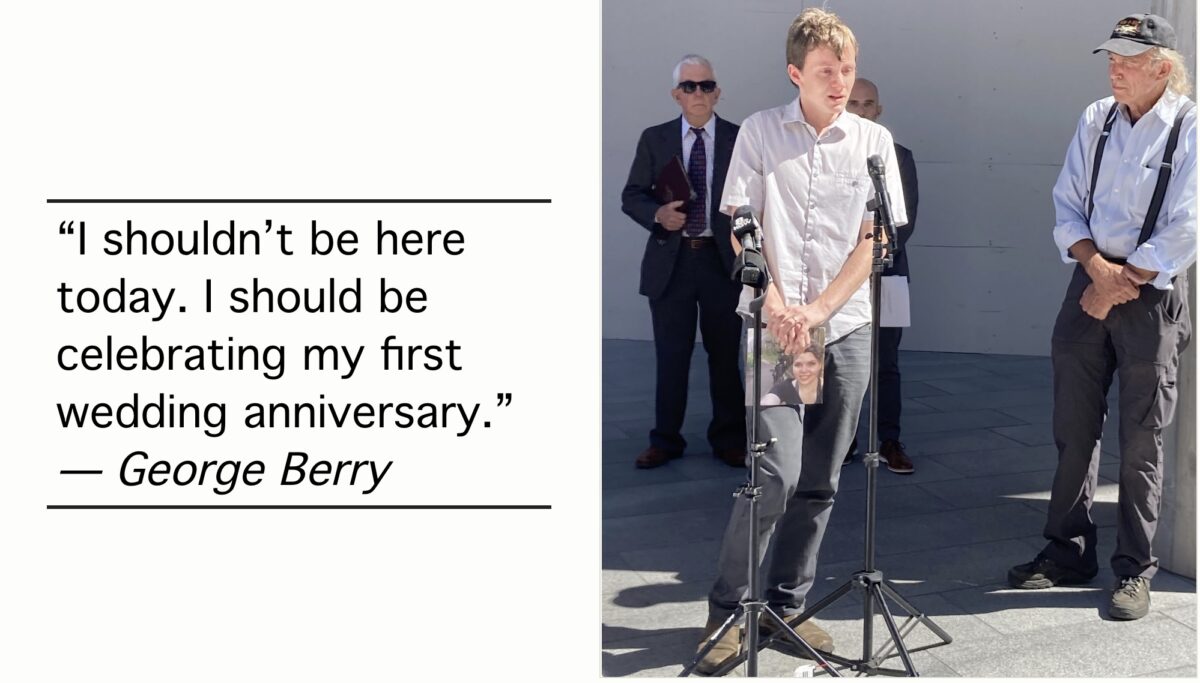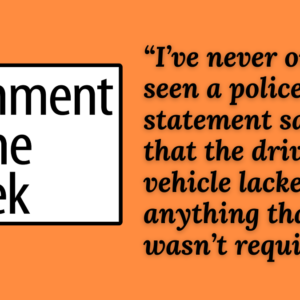
Lawyers representing the husband and estate of Joleen Braasch-Berry, a 26-year-old Salem woman who was struck and killed while riding her bicycle in the fall of 2020, filed a lawsuit Monday in Multnomah County against the manufacturer and distributors of “CRC Duster,” an aerosol spray used to clean computer keyboards. Also named in the complaint was the man who drove his car into Braasch-Berry minutes after inhaling the spray in a Home Depot parking lot.
At an emotional news conference in front of the courthouse Monday, the legal team from Thomas, Coon, Newton & Frost (a financial supporter of BikePortland) explained that in the past decade the abuse of dust removers, known as “huffing” or “dusting”, has soared above that of other intoxicating inhalants such as spray paint, gasoline, nitrous oxide and toluene — as indicated by skyrocketing emergency room visits. It is estimated that over three million people a year abuse dust removers to get high.
Advertisement

Dust removers use difluorethane as a propellant, but the chemical is also a well-known, fast-acting neurotropic intoxicant which can cause euphoria, loss of coordination, hallucinations and sudden death. This disturbing YouTube video of a young man huffing in a McDonald’s parking lot shows how debilitating the substance is.
Following the legal briefing, George Berry, clutching a photograph of his deceased wife, spoke softly into the microphones, “I shouldn’t be here today, I should be celebrating my first wedding anniversary.”
Later, attorney Ray Thomas (a well-known bike advocate and BikePortland contributor) took the microphone and made it clear that this case was personal to him. Braasch-Berry lived with the Thomas family when she attended Hillsboro High School, and they had remained close to her after she left for college and began her career. “When she was killed,” Thomas said at the press conference. “I read the police reports and found out that a duster product was used by this young man within five minutes of her death. I tried to find out if this had happened to others. And what I found was that there were all these news stories, but there was no central collection system to pick up these duster injuries and deaths. I thought that was wrong… this type of zombie driver, killing and injuring people, the incidence of it was far more prevalent than I ever realized.”
The Thomas, Coon, Newton & Frost effort is being aided by the Minneapolis-based law firm of Robins and Kaplan, which has expertise in the area and is actively litigating duster injuries and deaths in several states across the country.
The firm is seeking $6,005,794 for economic damages and pain and suffering from Home Depot, CRC Industries and William Justin Chambers, the man who ran into Braasch-Berry.
Thomas explained the rationale behind the lawsuit:
“We are trying to make it so the manufacturers of these products and the retailers that profit off of this pay the damage under Oregon law for the consequences of what happened to Joleen. We hope this will send a clear signal to this entire industry that if you allow these products to get into the hands of people like this driver, without any protection whatsoever, such as putting these products behind the counter, like other dangerous products that are ripe for abuse, you will be held responsible for damage. And money talks. And if they have to pay the damages for Joleen, it’s going to make them, and their insurance companies, take notice and do something to protect us so that maybe this will be less likely to happen to someone else.”
Also at the conference to support the complaint were representatives from the Street Trust, Oregon Walks and Families for Safe Streets.

— Lisa Caballero, lisacaballero853@gmail.com
— Get our headlines delivered to your inbox.
— Support this independent community media outlet with a one-time contribution or monthly subscription.







Thanks for reading.
BikePortland has served this community with independent community journalism since 2005. We rely on subscriptions from readers like you to survive. Your financial support is vital in keeping this valuable resource alive and well.
Please subscribe today to strengthen and expand our work.
I asked about this at Office Depot on Grand. They moved the cans near the checkout stands because they were constantly being stolen from the shelves.
There are rechargeable compressed air dusters for $50 on Amazon. Anyone with a legit use for compressed air could buy that.
I go through a can of duster maybe once every three years. I don’t need a $50 rechargeable can of duster. I want a $5 can of duster.
On the bright side, if you only need one every few years then it shouldn’t be a big deal if they are a little harder to buy.
I’m having trouble understanding what kinds of changes they are hoping will be implemented by retailers and manufacturers that will actually help to prevent this sort of thing from happening. Or more directly related to the case, what protections should have been in place to prevent this from happening in this instance?
Suppose they put the product behind the counter and you have to ask for it. Do we really think that the person who wants to get high will not simply tell the clerk that they would like to buy it? Suppose that you have to tell the store that you promise that you won’t use duster to get high—do we really not think that the customer who wants to huff the product would not make this promise??
It kind of seems like this is wading in the same direction as most of the other failed/counterproductive measures taken in the war on drugs. Attempting to limit access to intoxicants or criminalize them rarely has any meaningful impact on their use—and often contributes to larger problems. It is all too quick and easy to say that the drug and those who sell it are the problems—when in reality the right approach to solving these sorts of problems is to do the hard slow work of addressing the larger societal problems: Addressing the social inequities and issues that lead people to seek some small amount of comfort by using drugs, providing accurate (i.e. not propagandistic) education to children and to the public about drugs, their potential harms, and how they can be used in a way to minimize potential harm to yourself and others, etc.
What happened to Joleen is certainly tragic, but I have trouble seeing how this case is on the right track.
Yeah, and even if we banned this product entirely, some of its abusers would just move on to huffing paint, gasoline, or any other easily purchased nasty chemical.
My heart goes out to all involved.
Other than the suggested option of the compressor charged canister…which would be tough marketing option vs buying a $5 disposable can (since you only need such ~1x per year). Once this type of mis use + driver intoxication is illegal and identifiable…I wonder if they make ignition interlocks that can be set off by this chemical exhaling.
Perhaps once long term solution…I guess if Home Depot loses / settles they could make people bring their keyboard in to be blown for free at any HomeDepot. This would avoid the need for this type of product and drive foot traffic to HD too (thus HD would offer the service consistently and professionally) ?
Why not just give them the same status as otc medications that can be used as precursors for illegal drugs and require id and keep track of the amount people buy? You said it yourself, no one really needs more than 1 per year. If you really need more, like it’s your business to blow air on stuff, get an air compressor.
Just so I’m following, we should decriminalize drugs but make useful products that a small percentage of idiots abuse impossible to get?
There are ways to make this product safe but manufactures are like, “Yeah, that’s nice and all but we don’t want to do that.”
The big money is made by selling to huffers. That was the intent all along. Cleaning computer keyboards? C’mon.
You can’t sue or legislate reality away.
To the extent your observation is true, much more could be said for a wide range of other products.
Wondering what your thoughts are about those involved in the manufacturing and distribution of alcohol or marijuana which are more frequently involved in tragedies involving impairment.
There’s one particular product that I like. It’s a personal transport system — but people get killed and injured using it all the time. They even sell these things to kids — no roll bars, no safety cage, no warnings of all the ways this could be harmful. Unbelievably, jurisdictions even allow these to be operated on the same streets filled with cars and trucks. Weirdly, I don’t think using every entity somehow connected to this unsafe situation would be a step forward.
The complaint has a list of “Claims for Relief” which runs about four pages long: packaging doesn’t have a warning; failure to convey information about forseeable dangers to distributors and other relevant parties; selling in quantities far greater than was appropriate for its intended use; failure to manufacture with a bitterant or other abuse deterrent; safer, technologically feasible alternative designs and products are available–the list goes on.
Thanks, Lisa. These kinds of lawsuits are often the best way to force manufacturers to make products safer, and I appreciate your reporting on this, and send deepest condolences to Joleen’s family.
CRC is a big target. The company should be aware of these requirements. Another sad loss for the cycling community. One that I experienced personally.
I asked at a local “convenience store”, and they said they would sell intoxicants to anyone 21 and older who did not appear to be already intoxicated. I asked at the DMV and they said drivers have to sign something saying they won’t get high and drive into things and people. Regulation of gas/bullets/intoxicants is about profiting off the inherent impulsive needs of humans. If you work in these industries you know this already: the money is predictable. The nature of vise is the user doesn’t even identify it as a vise, but as a necessity, or a right.
Perhaps canned air, justice, street lights, potable water and cold-chain food are also viewed as a necessity now.
A moment to thank Lisa Caballero for this reporting and her comments above to help educate us. I have always had a can of this stuff around since the 70s. Originally I used it to dust off negatives as I printed 35mm negative images with chemicals ! And then flash forward to the 90s to get the beard hair out of the keyboard as I printed digital prints. More important is Lisa’s depth and her great curiosity at filling in about the news and the meaning of the news for all of us. Big Thanks Lisa.
Why don’t they just use compressed nitrogen? That would eliminate any harmful effects and its dirt cheap.
Ideally somebody who uses Boyle’s Law on a day-to-day basis would chime in here, but I note that the commercial duster canisters contain their gas under pressure in a liquid state. I don’t think nitrogen can be contained as a liquid without also being held at an extremely low temperature. So, I suspect the amount of dusting (i.e., the volume of gas) you would be able to do from a compressed nitrogen cylinder would pale in comparison to the amount of dusting you can do from a typical duster can which contains (potentially intoxicating) hydrocarbons.